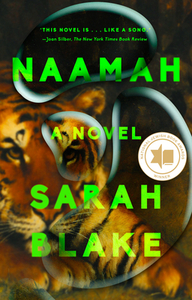Take a photo of a barcode or cover
This book tells the story of Noah and the ark through the eyes of Noah's wife, Naamah. As God only speaks to Noah and not her, she struggles with her role on the ark, feeling overwhelmingly important but at the same time overwhelmingly forgotten. The story follows the family before the flood, Naamah having to leave behind a lover, and the year on the flood as each family member deals with loss and Naamah finds comfort in the form of an angel and a bird she meets in a dream. I loved the prose as the authors background in poetry shone through, and I felt each question Naamah asked was justified. It was an unusual portrayal of religion, and the first time I had read a religious story of that length from the point of view of a woman. I thought the way her gender related to her religion allowed her to ask interesting questions about God and faith that I had not considered before. At times, I found the story to be a little strange, but overall it was a beautiful story.
fast-paced
Plot or Character Driven:
Character
I enjoyed this a lot more than I thought I would. Making a mythical character into a real three-dimensional person makes the story so much more compelling.
adventurous
slow-paced
Plot or Character Driven:
Character
Strong character development:
Yes
Loveable characters:
No
Diverse cast of characters:
Complicated
Flaws of characters a main focus:
Yes
emotional
hopeful
reflective
slow-paced
Plot or Character Driven:
Character
Strong character development:
Yes
Loveable characters:
No
Diverse cast of characters:
Yes
Flaws of characters a main focus:
No
incredibly sparse prose except for when it came to the sexual descriptions of basically everything. i do not think i have read a book with so much sex in it, without it being strictly erotica. this was meant to be a character study of Naamah but lack any actual depth and instead read as rather flat.
I enjoyed this book, though some of the scene changes were a bit hard to follow. Blake writes in a really blunt way about the body, biological processes, sex, etc., which is sometimes slightly off-putting but ultimately adds to the novel in my opinion. I appreciate how she writes about motherhood, sexuality, desire, despair, womanhood, and animal-human relationships all in the context of the Christian setting. I also really appreciate the retelling of Noah's ark with attention to the despair and loss each of the survivors faced and the way that death was pervasive all around them— literally, in the water surrounding them. Overall, a thoughtful, nuanced, and provocative read.
Review: What if Noah’s ark was told through his wife’s perspective?
America Magazine, May 27, 2019
https://www.americamagazine.org/arts-culture/2019/05/16/review-what-if-noahs-ark-was-told-through-his-wifes-perspective
Stories from the Bible springboard novelists’ imaginations in part because they are so spare. Often they sketch the basic details but elide mention of how all the people involved felt about these events. So it is with the story of Noah in Genesis. “Make yourself an ark of gopherwood,” God tells Noah. Cover it with pitch, fill it with pairs of animals, and take your family and set sail on the floodwaters. O.K., we infer that Noah replies, I’ll get right on that.
We know from Genesis that in a world full of wicked people, “God found favor with Noah.” But we have no idea how God felt about Noah’s family, including his wife, who is not named. The Jewish midrash Genesis Rabba says that Noah’s wife is Naamah, and Sarah Blake uses this name for the title and protagonist of her dream-like and intriguing first novel. Generations of Genesis readers have probably imagined Noah’s wife as obedient, chaste and reverent: so unobjectionable she does not merit much mention. Blake depicts Naamah as someone much wilder, sharing more in common with the animals she cares for. She is a practical, capable worker—it is Naamah who mucks out animals’ pens and kills newborn lambs to feed to large predators—but is also sensual and fanciful. Naamah, in Blake’s imagining, swims in the floodwaters and explores. She is also bisexual, adulterous and prone to seduction by an aquatic angel.
Naamah is the only one of the eight people aboard the ark who is comfortable with every aspect of living in a body—including sex, childbirth, nursing and death. When preparing the ark, Naamah realizes, “They would need a sealed bucket to [defecate] in, to clean up with, and she knew no one else would think of this.” The others do not venture into the floodwaters, fearing they will find bodies of those who perished, but Naamah dives in because she has to know. “It feels freeing, to swim, to be a part of the flood,” she tells Noah. “We’ve been so separate from it, from everything.” She asks Noah why the ark has not sunk with all the heavy animals inside, and he insists he does not know. The mystery of this situation suffuses Naamah. Noah takes everything on faith, but Naamah is not able to. She has to see and touch and learn. Naamah’s dreams mingle with reality and transport her to other times and places.
Blake writes in concise, honed prose, leaving abundant white space on each page. She imagines details about some of the mysteries behind the Noah story—like, did gnawing gerbils escape their wooden pens? (Yes.) But she leaves other questions unanswered: Just how did they lure the appropriate number and kind of animals onto the ark? In Naamah, there are more than one pair of some kinds of animals, which makes sense, given the chances of them getting sick and the need to feed smaller animals to larger ones. In one of the most beautiful scenes, Naamah communes with a thousand atlas moths. When they die, she gathers their bodies to feed other creatures and waits for their eggs to hatch and fill the room again.
“When the rains began, Noah’s doubt left him,” Blake writes. “When the rains continued, his guilt left him.” But Naamah’s doubts and guilt endure. It seems she commits some moral transgressions out of despair that she is not worthy of having been saved from the flood, as a sort of challenge to God. She eventually tells God: “I’m starting to accept that You will not judge me. Or that You have already passed judgment, and it doesn’t have much to do with me. I get it! You determined me not wicked, even if I feel otherwise.”
Blake’s vivid imagining of the life of a woman the Bible left unexplored takes some unexpected turns, but in doing so plunges readers more deeply into the mystery of God’s relationship with humanity’s second-chance Eve.
This article also appeared in print, under the headline "Humanity’s second-chance Eve," in the May 27, 2019 issue.
America Magazine, May 27, 2019
https://www.americamagazine.org/arts-culture/2019/05/16/review-what-if-noahs-ark-was-told-through-his-wifes-perspective
Stories from the Bible springboard novelists’ imaginations in part because they are so spare. Often they sketch the basic details but elide mention of how all the people involved felt about these events. So it is with the story of Noah in Genesis. “Make yourself an ark of gopherwood,” God tells Noah. Cover it with pitch, fill it with pairs of animals, and take your family and set sail on the floodwaters. O.K., we infer that Noah replies, I’ll get right on that.
We know from Genesis that in a world full of wicked people, “God found favor with Noah.” But we have no idea how God felt about Noah’s family, including his wife, who is not named. The Jewish midrash Genesis Rabba says that Noah’s wife is Naamah, and Sarah Blake uses this name for the title and protagonist of her dream-like and intriguing first novel. Generations of Genesis readers have probably imagined Noah’s wife as obedient, chaste and reverent: so unobjectionable she does not merit much mention. Blake depicts Naamah as someone much wilder, sharing more in common with the animals she cares for. She is a practical, capable worker—it is Naamah who mucks out animals’ pens and kills newborn lambs to feed to large predators—but is also sensual and fanciful. Naamah, in Blake’s imagining, swims in the floodwaters and explores. She is also bisexual, adulterous and prone to seduction by an aquatic angel.
Naamah is the only one of the eight people aboard the ark who is comfortable with every aspect of living in a body—including sex, childbirth, nursing and death. When preparing the ark, Naamah realizes, “They would need a sealed bucket to [defecate] in, to clean up with, and she knew no one else would think of this.” The others do not venture into the floodwaters, fearing they will find bodies of those who perished, but Naamah dives in because she has to know. “It feels freeing, to swim, to be a part of the flood,” she tells Noah. “We’ve been so separate from it, from everything.” She asks Noah why the ark has not sunk with all the heavy animals inside, and he insists he does not know. The mystery of this situation suffuses Naamah. Noah takes everything on faith, but Naamah is not able to. She has to see and touch and learn. Naamah’s dreams mingle with reality and transport her to other times and places.
Blake writes in concise, honed prose, leaving abundant white space on each page. She imagines details about some of the mysteries behind the Noah story—like, did gnawing gerbils escape their wooden pens? (Yes.) But she leaves other questions unanswered: Just how did they lure the appropriate number and kind of animals onto the ark? In Naamah, there are more than one pair of some kinds of animals, which makes sense, given the chances of them getting sick and the need to feed smaller animals to larger ones. In one of the most beautiful scenes, Naamah communes with a thousand atlas moths. When they die, she gathers their bodies to feed other creatures and waits for their eggs to hatch and fill the room again.
“When the rains began, Noah’s doubt left him,” Blake writes. “When the rains continued, his guilt left him.” But Naamah’s doubts and guilt endure. It seems she commits some moral transgressions out of despair that she is not worthy of having been saved from the flood, as a sort of challenge to God. She eventually tells God: “I’m starting to accept that You will not judge me. Or that You have already passed judgment, and it doesn’t have much to do with me. I get it! You determined me not wicked, even if I feel otherwise.”
Blake’s vivid imagining of the life of a woman the Bible left unexplored takes some unexpected turns, but in doing so plunges readers more deeply into the mystery of God’s relationship with humanity’s second-chance Eve.
This article also appeared in print, under the headline "Humanity’s second-chance Eve," in the May 27, 2019 issue.
Absurd and surreal. Erotic and comic. A fresh take on a tale almost as old as time.
challenging
dark
reflective
medium-paced
Plot or Character Driven:
Character
Strong character development:
Yes
Loveable characters:
Yes
Diverse cast of characters:
No
Flaws of characters a main focus:
Yes
This book is not for everyone. It is beautifully written, the author is very talented. But there is a lot of erotica, a lot of bodily functions, and a lot of odd dream sequences. I do think it is a wonderful description of grief and lonliness amidst an unrelatable isolation. Naamah has weird vivid dreams, grieves for her lost lover, meets an angel, interacts with children lost to the flood, and speaks with God. The writing in this is 5 star quality, but the story itself was a bit odd.
adventurous
reflective
Plot or Character Driven:
Character
Strong character development:
No
Loveable characters:
Yes
Diverse cast of characters:
Yes






